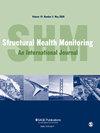An unsupervised transfer learning approach for rolling bearing fault diagnosis based on dual pseudo-label screening
IF 5.7
2区 工程技术
Q1 ENGINEERING, MULTIDISCIPLINARY
Structural Health Monitoring-An International Journal
Pub Date : 2023-11-08
DOI:10.1177/14759217231206579
引用次数: 0
Abstract
Deep transfer learning is an effective method for unsupervised fault diagnosis of rolling bearings. In some works, the pseudo-label of target domain prediction is used to improve the ability of target domain prediction in transfer learning. However, its validity depends on the quality of pseudo-label generated by the network itself, which is easy to cause the misclassification of the samples. Aiming to this, a dual sample screening (DSS) method based on the information of predicted label changes is proposed in the article, and it is applied to the fault diagnosis of rolling bearings with variable working conditions. DSS combines pre-screening and real-time screening and uses the continuous output of prediction label change information in the training process to improve the network training. It owes to eliminating part of the target domain samples with prediction errors in the stage of network training with pseudo-label. The proposed method improves the stability of the pseudo-label involved in the training and alleviates the negative effects caused by the pseudo-label. The experimental results on Paderborn University dataset show that, compare with the deep transfer learning fault diagnosis method based on pseudo-label cross-entropy, the average diagnostic accuracy of the six transfer tasks using DSS is increased by 5.97%, which effectively improves the fault diagnosis accuracy of rolling bearings.基于双伪标签筛选的无监督迁移学习滚动轴承故障诊断方法
深度迁移学习是一种有效的滚动轴承无监督故障诊断方法。在一些研究中,目标域预测的伪标签被用来提高迁移学习中目标域预测的能力。但其有效性取决于网络本身生成的伪标签的质量,容易造成样本的误分类。针对这一点,本文提出了一种基于预测标签变化信息的双样本筛选(DSS)方法,并将其应用于变工况滚动轴承的故障诊断。DSS将预筛选和实时筛选相结合,在训练过程中利用预测标签变化信息的连续输出来改进网络训练。这是由于在使用伪标签的网络训练阶段,消除了部分存在预测误差的目标域样本。该方法提高了训练中所涉及的伪标签的稳定性,减轻了伪标签带来的负面影响。在帕德博恩大学数据集上的实验结果表明,与基于伪标签交叉熵的深度迁移学习故障诊断方法相比,使用DSS对6个迁移任务的平均诊断准确率提高了5.97%,有效提高了滚动轴承的故障诊断精度。
本文章由计算机程序翻译,如有差异,请以英文原文为准。
求助全文
约1分钟内获得全文
求助全文
来源期刊
CiteScore
12.80
自引率
12.10%
发文量
181
审稿时长
4.8 months
期刊介绍:
Structural Health Monitoring is an international peer reviewed journal that publishes the highest quality original research that contain theoretical, analytical, and experimental investigations that advance the body of knowledge and its application in the discipline of structural health monitoring.

 求助内容:
求助内容: 应助结果提醒方式:
应助结果提醒方式:


